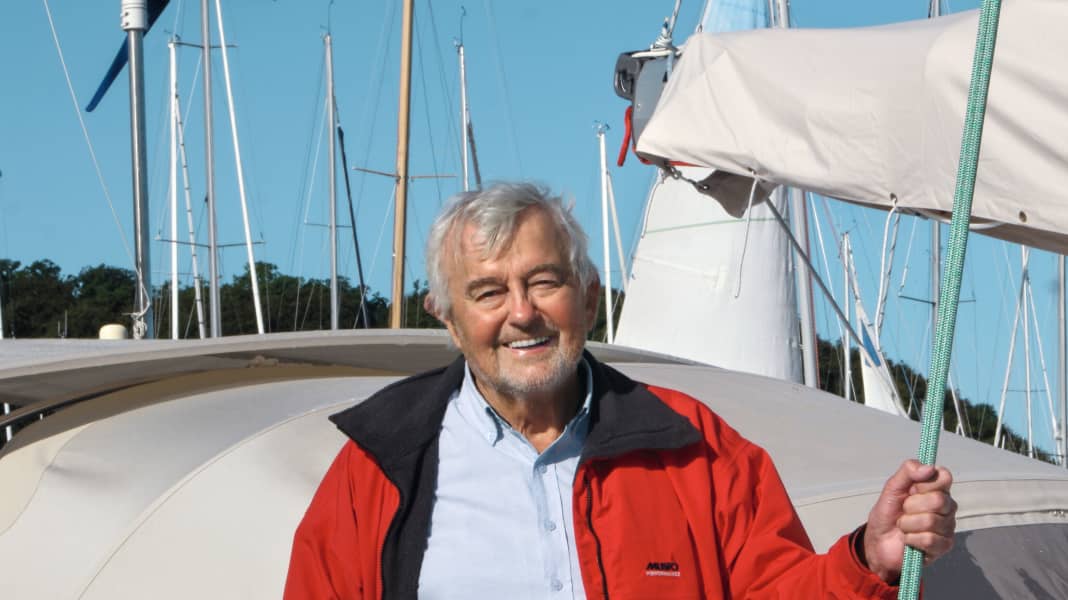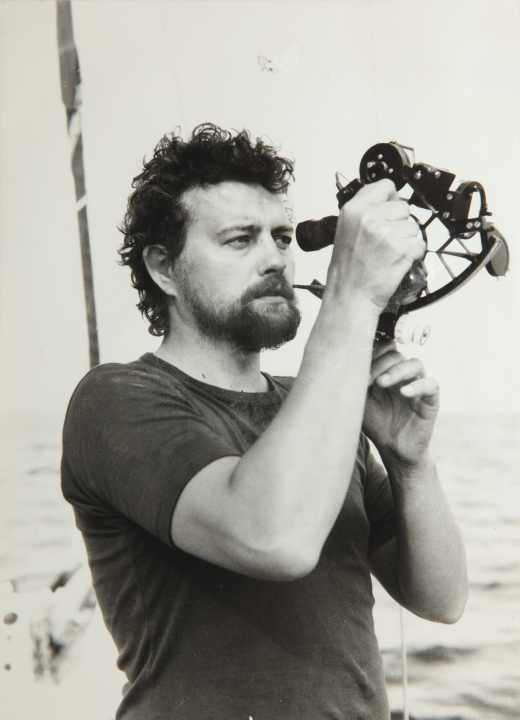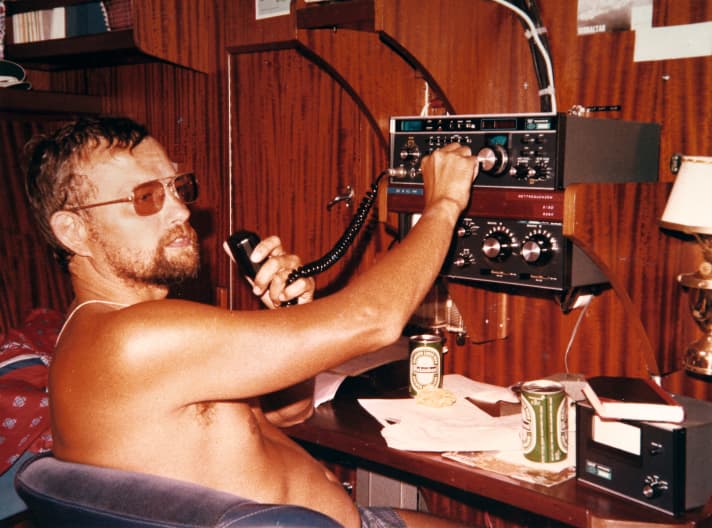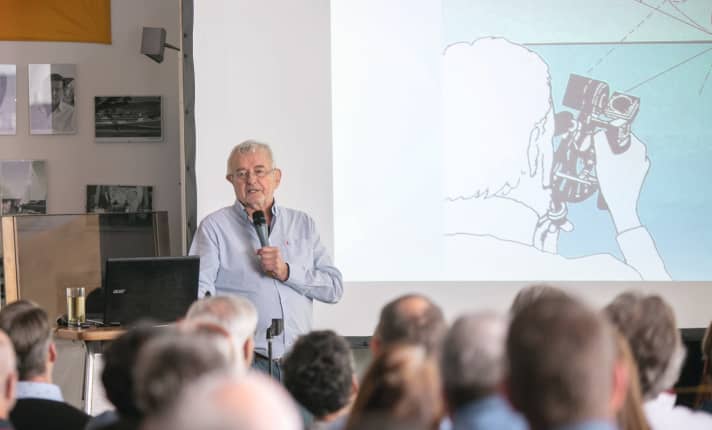Blue water: Bobby Schenk: "Sailing around the world is nothing special anymore"
Ursula Meer
· 16.11.2021

Bobby Schenk, born in 1939, has been travelling the world's oceans since the 1970s. In 1971, he and his wife Karla were one of the first Germans to set sail around the world on the ten-metre plastic yacht "Thalassa". After four years, the couple returned to Germany and their careers as a lawyer and pharmacist. Further sailing trips followed, with long stays in the South Seas and around Cape Horn.
The couple also embarked on other adventures together, such as a flight across the South Atlantic in a single-engine aircraft or crossing it by ship without navigation instruments. The journey ended with a precision landing on Barbados.
For decades, Schenk was also involved in astronavigation and contributed to the development of the first navigation computer. He passed on his knowledge to budding long-distance sailors in numerous books and seminars, which were always sold out. His website www.bobbyschenk.de is one of the largest, if not the largest, German-language source of information for blue water sailors.
On the following page, Schenk looks back on his years at sea and on land in a YACHT interview.
YACHT: Bobby, your popular blue water and astronavigation seminars took place for the last time at the Interboot trade fair in September. How did that feel?
Bobby Schenk:Of course, I did this with one eye crying and one eye laughing. There were always a lot of very interested participants in the seminars. And each of the speakers had special experiences and reported on them. In addition, there were often active blue water sailors among the visitors. Seven circumnavigators, three of whom had sailed around Cape Horn, attended my seminar at Interboot alone. That's an enormous wealth of knowledge and experience that comes together. But it also involves a huge amount of work. The preparation and follow-up work takes a lot of time, both in terms of content and technology. As much as I will miss the exciting topics and people, I won't miss all the work.
Long-distance sailing has changed a lot over the years. What do you think are the most significant advances?
Of course, a lot has changed, especially with the advent of the internet and GPS. Today, we sailors have a plotter on board with so much information that we couldn't even have dreamed of when we were preparing for our first voyage decades ago. Today, any beginner can navigate from one point to the next. We, on the other hand, were much more challenged in terms of navigation. We orientated ourselves by the stars. We also had to manage without sophisticated instruments. We couldn't even measure the current. How often did we anchor far out off an island in the evening in order to observe the currents the next day? We had to be extremely careful if we didn't want to end up on a reef. Today, there are countless reports on the internet, from details of fishing grounds to reviews of restaurants at the end of the world. And yet I have the impression that more sailors have accidents with their boats today than in the past.
What else has progress brought?
We can keep in touch with people all over the world at any time. But when we cast off, we didn't know whether we would ever see our parents again. The biggest holidays for us were when we collected the post from some post office in the Marquesas after three months. We would go on the ship with it, open a bottle of champagne and then slowly and happily unpack spare parts and read letters. Today, many things have become so much easier.
"WHEN THE OPPORTUNITY SUDDENLY PRESENTS ITSELF, YOU HAVE TO SEIZE IT"
Do you notice that in the people who attend your seminars?
Yes, there are a lot more dreamers among the participants than there used to be. I don't mean that in a negative way, on the contrary. They are people who have enough money but little experience and have thought about sailing around the world. That's nothing special any more. More and more people are looking for independence and self-sufficiency - and also for the challenge that comes with a long voyage. I believe that cruising has a great future; more and more people will set sail. One thing has remained the same, by the way: Two thirds of the people who attend the seminars were and are couples.
What about the ships? What has changed the most in them?
Above all, more and more crews are travelling on catamarans. They allow faster and more comfortable journeys. With keelboats, not much has actually changed apart from the technical equipment. Back then, our fully loaded cruising boats travelled at a maximum of six knots. It's about the same with today's boats. But speed doesn't count - then as now, long-distance sailors take the time to enjoy their journey. The boat is first and foremost their floating home.

How have you developed the content of your seminars over the years?
I have, of course, addressed the constant technical innovations. But when it comes to concrete experiences, it's not so easy to keep finding new and interesting content. Many sailors want to speak at the seminars, but they have to offer the audience something special. Unfortunately, a circumnavigation in itself is no longer a calling card these days; many stories are repetitive. At Interboot, someone reported on how theory differs from practice. He simply set off with his catamaran and realised that almost all of his ideas differed from the real situation. The challenges he had to face are interesting experiences for the many theorists still sitting in the seminars.
"FOR ME, THE CONSTRUCTION CRANES IN MUNICH WERE THE MASTS OF SHIPS"
The theorists and the practitioners - what is the situation in your seminars?
For 18 years, I gave lectures at trade fairs, with an average of 150 visitors. There must have been two and a half or three thousand people at Interboot alone. Some of them have certainly sailed around the world. But there are also people who sit in the seminars for five years without interruption. They tend to dream of the long voyage. When you say to them: "Get going, you can do it!", they don't listen because there's still so much to do. I've often experienced this: people who plan meticulously never set off. Sailors are resistant to advice in many respects and are particularly resistant in this respect. Some, however, realise that one hundred percent planning is not even possible. They simply say, okay, we'll set off now and see what happens. Defects on the ship can also be rectified en route, perhaps even better. Once they are on their way or have completed their journey, they send me a letter. I'm always very happy about that.
What is the recommendation?
I have a recipe for life: don't plan too much! Be on the lookout for an opportunity and then seize it. It was the same for me. The opportunities weren't thrown at me, they were suddenly there and I seized them.

The first time was in 1971, when you set off on a round-the-world trip with your wife Karla. How did you prepare?
We had to acquire a lot of knowledge and skills, it was a full-time job. Firstly, we had to learn astronavigation. To do this, we spent six months at university two evenings a week being taught the subject by experienced sailors, together with others who had the same dream. We quickly became a real community, sharing our knowledge and experience with each other. I also became an amateur radio operator so that I had a connection to the outside world when I was travelling. And then there were Elga and Ernst-Jürgen Koch, the German pioneers who returned from their circumnavigation in 1967. We wrote to them and asked for a meeting; we were very interested in what they had experienced. We travelled from Munich to Hamburg especially for this. We sat in their living room for a whole day and asked questions, listened and learnt. The literature was still manageable.
"SIMPLIFYING ASTRONAVIGATION WAS A TOUGH BATTLE"
But there have already been a few books. Which ones do you remember?
One unforgettable book is "Sailing the Seven Seas" by Eric Hiscock, the father of all cruising sailors. We also devoured books such as "Sailing in Coastal Waters" and "Seamanship". We realised that you need to know a lot more to sail around the world, but we gained our first insights from this reading. We were further ahead in England. There were publications on sailing routes around the world, with information on currents and wind conditions, which we now read in Jimmy Cornell's "Atlas of the Oceans". We got hold of these. Finally, we found the American "Seven Seas Cruising Association", probably one of the first associations to publish information about sailing the world's oceans. Each of the 5000 members was called a "Commodore" and was obliged to write reports about their travel experiences. Nothing about longing for faraway places and other chatter, just the facts: How high is the harbour fee here, where is a beacon fee wrongly charged and much more. Collected in a magazine that appeared every four weeks. It's hard to imagine, but for us it was the only up-to-date and detailed information about the various areas.
You have undertaken many long journeys and yet you have always returned home and to your professional life. Did you always have the idea of the next long trip in mind?
No, we always returned properly and I really enjoyed it. I no longer have sand between my fingers from rowing the dinghy, I'm not sweating all the time - those were my thoughts back at my desk. They made my everyday office life easier. However, I could see the construction cranes from my window over the rooftops of Munich and always imagined that they were the masts of schooners.
And yet at some point the longing was so great that it started again?
Yes, I'm an enormously playful guy and my wife Karla took part in everything with enthusiasm. None of this would have been possible without her. The many sailing trips, the flight across the Atlantic or crossing it without navigation instruments - if we had an idea, we wanted to realise it.
"Because I have no sense of place, I've always immersed myself in nautical charts"
Despite all the technical innovations, astronavigation is an integral part of seafaring. You have been involved with it all your life. How did that come about?
It was an American with a sense of practicality who taught me the simple and precise method of astronavigation called "Noon longitude by two equal altitudes". I brought it back to Germany and wrote an article about it in YACHT: "Astronavigation für den Wochenendtörn". Many people thought it was irresponsible to explain such an important instrument so simply. The article caused quite an uproar, there were polemical and even angry letters to the editor. I had to fight through it long and hard. Maybe that's what made me stick to the issue so vigorously.
Honestly, have you ever got lost?
No. Or yes, often! When I'm travelling by car, actually all the time. I have no sense of place whatsoever. And perhaps that's my strength: because I have no sense of place, I've always immersed myself in nautical charts.

You were also happy to share your experiences and knowledge. When did that start?
I had always enjoyed reading YACHT and wanted to write for it one day. In 1972, we were caught in a terrible hurricane in Fiji, which we only just survived. At the time, I said to a boat neighbour that I would like to write an article about it, but only if I knew it would be printed. He replied: "It's quite simple. What you don't write can't be printed." So I wrote the article. To my great surprise, it was published and I was asked to write further reports if anything interesting came up.
You also put a lot of energy into running your website, which is one of the most visited among German sailing websites. Will you be continuing it?
I write most of the articles on my site myself, and I endeavour to answer all questions in detail. It's a lot of work and takes a lot of time. I would like to see more articles from other long-distance sailors. I will certainly include them on my site in the future. The wealth of knowledge will remain. But I can't and don't want to do it with the intensity I've been running the site for 21 years.
Looking back, would you do anything differently?
That may sound arrogant, but clearly: no!
And what will you do from now on?
I have a new hobby: flying drones. And soon I'll be travelling on the Mediterranean again. Under sail.
The interview was published as part of our big blue water special in YACHT 22/2021. If you missed the issue, you can download it here. in the Delius Klasing Verlag online shop (click here).

